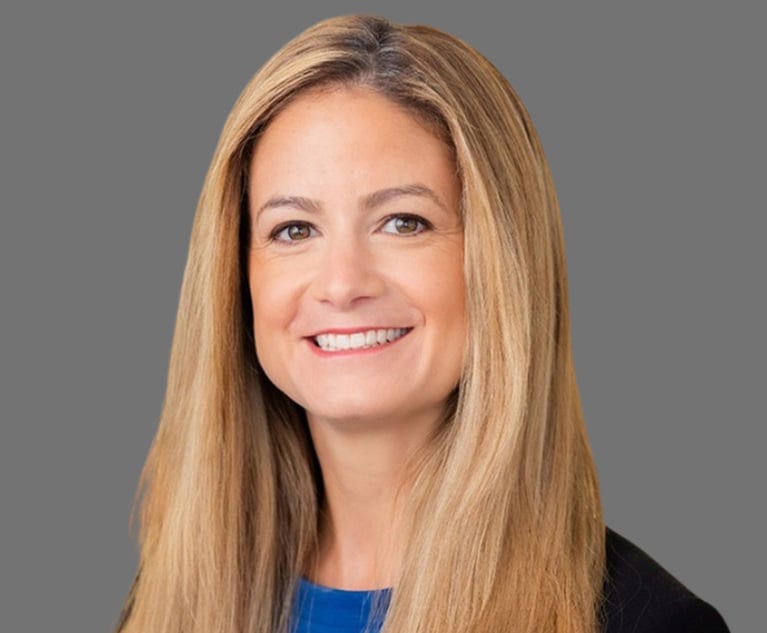Pa. July Bar Pass Rate Ticks Up Slightly. Which Area Law Schools Led the Way?
Pennsylvania's improved pass rates this year appear to fall in line with a national trend.
October 25, 2019 at 04:59 PM
4 minute read
 Photo: Fotolia
Photo: Fotolia
The pass rate for first-time takers of the July Pennsylvania bar exam rose slightly this year after dipping in 2018.
Of the 1,093 first-time applicants this year, 80.6% passed, up from 79% last year. In 2017, 81.2% passed, a marked jump from 75.4% in July 2016, which was the lowest pass rate for any July exam for which the state Board of Law Examiners has made data about bar exam pass rates available.
The pass rate for all test takers in July 2019 also increased, to 73% from 71%.
The downward trend in the total number of applicants who took the July exam continued, however, dropping to 1,270 this year, down markedly from 1,293 test takers in 2018.
Pennsylvania's improved pass rates this year appear to fall in line with a national trend.
Officials with the National Conference of Bar Examiners had predicted that pass rates would rise due to an increase in the national average score on July's Multistate Bar Exam, which is the 200-question multiple-choice portion of the exam that accounts for half of a test-takers score in most jurisdictions. (States can assign different weights to the MBE.) The average MBE score this July was 141.1, up from 139.5 the previous year. That 1.6-point increase is the largest single-year jump since 2008, according to the National Conference of Bar Examiners.
"Most jurisdictions, but not all, will see an improvement in scores and pass rates," said Judith Gundersen, president of the national conference.
Results by School
This year, Widener University Delaware Law School had the lowest overall pass rate at a Pennsylvania-area school in 2019, with 46.3% of its 54 applicants passing the July exam. Last year, 63.3% of its 79 applicants passed. The school also had the lowest first-attempt pass rate in 2019, with about 63.2% of its 38 first-timers being successful.
For the fourth year in a row, the highest overall pass rate among Pennsylvania-area law schools belonged to the University of Pennsylvania Law School. This year, 88.2% of its 34 applicants passed the July exam. And like last year, all of its applicants were first-timers.
But unlike the past four years, Penn Law did not take the top spot among Pennsylvania area schools for its first-attempt pass rate.
This year, that distinction went to the University of Pittsburgh School of Law, which saw 91.4% of its 81 first-time test-takers pass. The school also had the third-best overall pass rate at about 85%.
"We congratulate the Class of 2019 on their incredible and historic achievement, which reflects their collective hard work, perseverance, and support of one another," Pitt Law Dean Amy J. Wildermuth said in a statement.
Wildermuth also credited Rob Wible, Pitt Law's director of academic success and bar exam services.
"He has steadily expanded and improved our programs and has added a personalized human touch to address the stresses our law students face. His support of our students has made all the difference," she said.
Meanwhile, in the second batch of July test results since Penn State split its law school into two separate institutions, Penn State Dickinson Law in Carlisle had the second-best first-attempt pass rate, slightly edging out Penn Law with 88.5% of its 26 first-timers passing. It also came in second in terms of overall passage rates, with 85.7% of its applicants passing.
Its sister school, Penn State Law in University Park, came in seventh among Pennsylvania-area schools in terms of both first-time passage rate, with 81.8% of its 44 first-timers successful, and overall passage rate, with 80.4% of its 46 test-takers passing.
The rest of the first-time applicant pass rates at Pennsylvania-area schools were: 87.9% at Duquesne University School of Law; 86.9% at Villanova University Charles Widger School of Law; 85.4% at Temple University Beasley School of Law; 78.5% at Drexel University Thomas R. Kline School of Law; 66.1% at Widener University Commonwealth Law School; and 64.7% at Rutgers Law School.
This content has been archived. It is available through our partners, LexisNexis® and Bloomberg Law.
To view this content, please continue to their sites.
Not a Lexis Subscriber?
Subscribe Now
Not a Bloomberg Law Subscriber?
Subscribe Now
NOT FOR REPRINT
© 2025 ALM Global, LLC, All Rights Reserved. Request academic re-use from www.copyright.com. All other uses, submit a request to [email protected]. For more information visit Asset & Logo Licensing.
You Might Like
View All

JCPenney Customer's Slip-and-Fall From Bodily Substance Suit Best Left for a Jury to Decide, Judge Rules
4 minute read
People in the News—Jan. 9, 2025—Rawle & Henderson, Armstrong Teasdale
3 minute read
Trending Stories
- 111th Circuit Rejects Trump's Emergency Request as DOJ Prepares to Release Special Counsel's Final Report
- 2Supreme Court Takes Up Challenge to ACA Task Force
- 3'Tragedy of Unspeakable Proportions:' Could Edison, DWP, Face Lawsuits Over LA Wildfires?
- 4Meta Pulls Plug on DEI Programs
- 5On the Move and After Hours: Meyner and Landis; Cooper Levenson; Ogletree Deakins; Saiber
Who Got The Work
Michael G. Bongiorno, Andrew Scott Dulberg and Elizabeth E. Driscoll from Wilmer Cutler Pickering Hale and Dorr have stepped in to represent Symbotic Inc., an A.I.-enabled technology platform that focuses on increasing supply chain efficiency, and other defendants in a pending shareholder derivative lawsuit. The case, filed Oct. 2 in Massachusetts District Court by the Brown Law Firm on behalf of Stephen Austen, accuses certain officers and directors of misleading investors in regard to Symbotic's potential for margin growth by failing to disclose that the company was not equipped to timely deploy its systems or manage expenses through project delays. The case, assigned to U.S. District Judge Nathaniel M. Gorton, is 1:24-cv-12522, Austen v. Cohen et al.
Who Got The Work
Edmund Polubinski and Marie Killmond of Davis Polk & Wardwell have entered appearances for data platform software development company MongoDB and other defendants in a pending shareholder derivative lawsuit. The action, filed Oct. 7 in New York Southern District Court by the Brown Law Firm, accuses the company's directors and/or officers of falsely expressing confidence in the company’s restructuring of its sales incentive plan and downplaying the severity of decreases in its upfront commitments. The case is 1:24-cv-07594, Roy v. Ittycheria et al.
Who Got The Work
Amy O. Bruchs and Kurt F. Ellison of Michael Best & Friedrich have entered appearances for Epic Systems Corp. in a pending employment discrimination lawsuit. The suit was filed Sept. 7 in Wisconsin Western District Court by Levine Eisberner LLC and Siri & Glimstad on behalf of a project manager who claims that he was wrongfully terminated after applying for a religious exemption to the defendant's COVID-19 vaccine mandate. The case, assigned to U.S. Magistrate Judge Anita Marie Boor, is 3:24-cv-00630, Secker, Nathan v. Epic Systems Corporation.
Who Got The Work
David X. Sullivan, Thomas J. Finn and Gregory A. Hall from McCarter & English have entered appearances for Sunrun Installation Services in a pending civil rights lawsuit. The complaint was filed Sept. 4 in Connecticut District Court by attorney Robert M. Berke on behalf of former employee George Edward Steins, who was arrested and charged with employing an unregistered home improvement salesperson. The complaint alleges that had Sunrun informed the Connecticut Department of Consumer Protection that the plaintiff's employment had ended in 2017 and that he no longer held Sunrun's home improvement contractor license, he would not have been hit with charges, which were dismissed in May 2024. The case, assigned to U.S. District Judge Jeffrey A. Meyer, is 3:24-cv-01423, Steins v. Sunrun, Inc. et al.
Who Got The Work
Greenberg Traurig shareholder Joshua L. Raskin has entered an appearance for boohoo.com UK Ltd. in a pending patent infringement lawsuit. The suit, filed Sept. 3 in Texas Eastern District Court by Rozier Hardt McDonough on behalf of Alto Dynamics, asserts five patents related to an online shopping platform. The case, assigned to U.S. District Judge Rodney Gilstrap, is 2:24-cv-00719, Alto Dynamics, LLC v. boohoo.com UK Limited.
Featured Firms
Law Offices of Gary Martin Hays & Associates, P.C.
(470) 294-1674
Law Offices of Mark E. Salomone
(857) 444-6468
Smith & Hassler
(713) 739-1250





